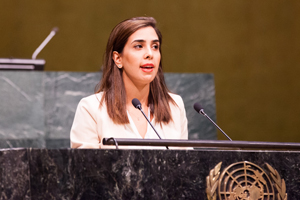
Hiva Rafiei
Essex Business School student Hiva Rafiei gave a speech at the General Assembly of the United Nations (UN) in New York after being selected as one of the winners of the United Nations Academic Impact Global Essay Contest.
The Iranian-born student is studying for a PhD in Organization Studies under the supervision of Dr Manuela Nocker after completing her Masters in Global Project Management at Essex.
This is the second year running an Essex student has been selected as a winner in the United Nations Academic Impact Global Essay Contest with Yasmin Afina successful in 2014.
As part of her prize, Hiva was one of 70 students from around the world invited to travel to the United States to attend the Many Languages, One World Global Youth Forum at Adelphi University in New York with the event culminating with a trip to speak at the UN General Assembly.
We caught up with her to ask about the experience:
What was it like to speak at the United Nations?
“Speaking at the United Nations was a unique experience, but what made it even more unique was the company I had - the other winners in six UN official languages including Arabic, Chinese, English, French, Russian and Spanish. You could feel the positive vibes that day from the early morning we all woke up, until we got to the UN. Everyone seemed to be on a mission and had important points to raise from the podium that has hosted great change leaders of the world.”
What was the reaction to your speech?
“As the English team, we had to prepare a speech on "promoting a sustainable economic growth, full productivity, and employability in decent jobs for all, by 2030". Each of us got the chance to choose a sub-topic to address this goal. I went for the educational sides of it and tried to show how our educational systems might have indirectly affected the high rates of unemployment that we witness today in almost every continent more or less. I tried to shed light on the need to put more emphasis on management studies (where I am currently conducting my doctoral studies) by saying that social sciences deserve the same degree of focus as some other subjects like medicine, engineering and law. Looking critically we see how different nations are suffering from mismanagement.
“I was fascinated to receive lots of positive comments right after my first practice in front of the whole group of winners in all languages. People from the Arabic, French, and Russian group came to me and told me how strongly they agreed with my points and how they have personally felt the need for a change in their own educational curriculums.
“Similarly, after finishing the speeches in all six languages in the General Assembly Hall of the United Nations, I got the chance to talk to the ambassadors from different countries and was happy to hear that I had successfully communicated my point in two minutes and addressed the issues of their concern.”
How did you benefit from taking part in the event?
“I got to know all the other students who were all clearly interested in other languages and cultures as I have always been. You walked around the hall where we had to prepare our speeches and you could hear people speaking in English, French, Arabic, Russian, Chinese, and Spanish. Everyone was able to speak fluently in at least two major languages and I had the opportunity to practice a bit of French, Spanish, and Arabic! People were genuinely interested in knowing about your culture and the discussion could keep everyone awake even after a long day of hard work.
“Coming back to the UK now, I am glad to have established friendships with people from all over this world, from Uruguay to Paris, Jordan to China and Ukraine. Yes, this was all about networking with people who share your passion in life: language diversity.”
United Nations Academic Impact Global Essay Contest
More than 1,200 students from around the world entered the Many Languages, One World contest with 70 winners chosen from 42 countries representing 60 universities.
The competition asked students to write about the post-2015 global development agenda of the United Nations. Winners were then asked to work in teams to prepare talks on the United Nations Post-2015 Sustainable Development Agenda at the General Assembly.
The contest was organized by ELS Educational Services, Inc. and the United Nations Academic Impact (UNAI).
This is second year the Many Languages, One World Essay Contest and Global Youth Forum have been held. For more information on Many Languages, One World please visit the competition website..